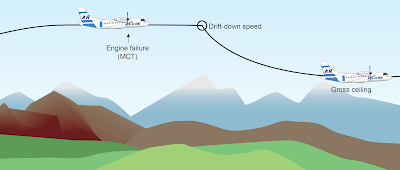I have created this simple video during my studies on the Perfomance Manual of ATR. The ATR's world is very big and I find very useful to share any kind of information and knowledge, and at sametime it's a good practice for me any time I make a qualification on a new machine. I hope you enjoy the simplicity.
Following engine failure procedure in the ATR aircraft
In any case, the maximum continuous power (MCT) is set to the remaining engine.
• If no obstacle limitation (condition 1)
If the engine failure occurs during the cruise, a 200 kt descent is performed until a vertical speed of 500ft/mn is reached.
If the engine failure occurs during climb, climb is continued at VmLB0° or VmLB15° depending on the atmospheric conditions, until the single engine ceiling.
• If obstacle limitation (condition 2)
If the engine failure occurs during cruise, over a mountainous or a restricted area, the drift-down procedure is followed.
The minimum manoeuver speed in flight is VmLB flaps 0° in normal conditions and VmLB flaps 15° in icing conditions. This speed ensures the highest altitude versus the distance in climb, and the best lift-to-drag ratio speed during descent.
This speed is selected when an engine failure occurs in flight and that the vertical profile has to be optimised.
This procedure consists in:
– deciding at the decision point whether to continue, divert or return.
– then decelerating to VmLB0° or VmLB15° depending on the atmospheric conditions, called in this case drift-down
speed, and descending to the gross ceiling, where, if the obstacle is cleared, a single engine cruise is initiated.
NOTE: Procedures are detailed in the FCOM 3.09.03, One engine inoperative procedure - in flight.


Nessun commento:
Posta un commento
I commenti sono sempre molto apprezzati e nel pieno spirito della condivisione della passione per il volo in tutte le sue forme.